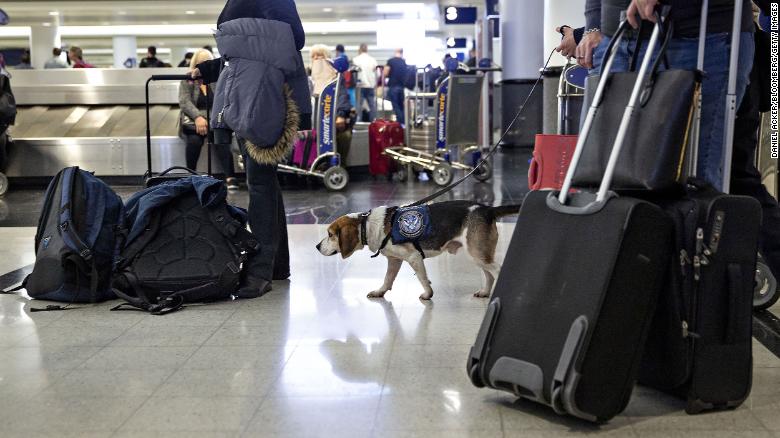What are the happiest destinations for tourists in 2022?
1:26
(CNN) --
United States border officials have a message for travelers bringing food from abroad: Fines are expensive.
Last month, a passenger traveling from Indonesia to Darwin airport in Australia's Northern Territory was fined $1,874 after two Beef Sausage and Egg McMuffins were found in his luggage, along with a ham croissant.
(Australian authorities had imposed strict new biosecurity measures on all arrivals following an outbreak of foot-and-mouth disease in Indonesian cattle.)
Passenger fined $1,874 after finding two undeclared McMuffins in his luggage
In another incident, a few days earlier, an Australian woman was fined $1,844 after forgetting to declare the leftovers from a Subway sandwich she had bought in Singapore.
In the past year alone, US border agents have fined passengers for packing a wide range of undeclared foods, including balut eggs, pork bologna and turkey ham.
Border agents conducted "630,150 positive passenger inspections" in 2021, according to fiscal year statistics released by US Customs and Border Protection (CBP), and issued thousands of sanctions and infractions to travelers who did not declare prohibited agricultural articles.
CBP officers at Houston's George Bush Intercontinental Airport discovered balut eggs in a passenger's luggage on March 6.
Balut eggs contain a duck embryo, and are boiled and eaten in the shell.
Failure to declare food products at US air, sea and land border entry points can result in fines and penalties of up to $10,000, according to CBP.
Here's what you need to know before bringing food products into the US.
advertising
Why are some foods not allowed?
Travelers bringing food into the US can inadvertently introduce foodborne pests and diseases, which can have a devastating effect on agriculture and the environment.
And an outbreak of pests or diseases could affect not only farmers.
It also means an increase in the cost of groceries and the scarcity of some foods for consumers.
Last year, border agents discovered 264 pests at US ports of entry, up slightly from the 250 found the year before.
Pests intercepted last year include a Saunders 1850 butterfly larva found on pineapples from Costa Rica.
The larva feeds on plants and legumes, and is considered an invasive pest found primarily in the Amazon rainforest.
Their introduction to the US ecosystem could be detrimental to the agricultural industry, according to CBP.
"We work closely with the US Department of Agriculture, Animal and Health Inspection Services to prevent the introduction of foreign plant pests and animal diseases," a CBP spokesperson told CNN.
What food products are not allowed in the US?
Most meat, poultry, dairy and egg products are banned or restricted in the US, with regulations depending on the country of origin and the livestock diseases prevalent in the region.
The United States Department of Agriculture (USDA) bans animal and avian products from countries where cases of livestock diseases such as mad cow, foot-and-mouth disease, avian flu have been reported. and swine fever.
The USDA offers a link where travelers can check the most common animal diseases in certain countries.
Sometimes there are gray areas.
Pork products from Mexico are prohibited, for example, but a small amount for personal use, such as a ham sandwich, may be allowed at land borders if the meat is well cooked.
What foods can be brought to the US?
A long list of foods is allowed in the US, including condiments, cooking oils, bread, cookies, cakes, cereals, packaged tea, and other baked and processed goods.
CBP has a list of allowed items on its website.
Jarvis, a beagle, works in the baggage claim area of Chicago's O'Hare International Airport.
He is part of the Beagle Brigade, which collaborates with border agents to sniff out prohibited foods in luggage.
But there's a catch: If a traveler is carrying more than 50 pounds of an item, it's considered a commercial shipment and must undergo additional measures, such as extra security inspections.
In addition, all agricultural foods must be declared on US Customs forms so inspectors can examine them to make sure they don't carry harmful foreign pests or diseases.
"The declaration must cover all items transported in checked baggage, carry-on baggage, or in a vehicle," the CBP website states.
Can you bring fruits or vegetables?
The short answer is no.
Nearly all fresh and frozen fruits and vegetables are banned from entering the US due to the risk of pests and diseases, some of which can survive freezing temperatures, according to the US Department of Agriculture. fruits and vegetables provided on a plane or cruise ship should be left behind, says Lucero Hernández, of the Federal Animal and Plant Health Inspection Service.
Travelers crossing a land border into the United States from Canada may bring some fresh fruits and vegetables, as long as they were grown in Canada.
But they need proof that the products are free of soil, pests and diseases, and that they were grown in Canada, not just sold there, the USDA says.
And in all cases, travelers entering the US should keep receipts and original containers to prove the country of origin of food products, according to CBP.
What happens if you bring prohibited items?
Travelers who declare produce in their luggage face no penalties, even if an inspector concludes the items cannot enter the country, the USDA says.
In these cases, the food is destroyed.
"An apple or snack that may be brought in by mistake will not always be a major incident," explains the CBP spokesperson of an inadvertent failure to declare a food item.
"However, attempting to introduce prohibited items would cause traveler delays and could result in a fine."
"Failure to declare a prohibited food item may result in the issuance of a civil penalty," the spokesperson added.
AirportFood









